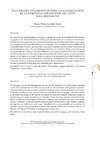Identificador persistente para citar o vincular este elemento:
https://accedacris.ulpgc.es/jspui/handle/10553/59945
| Campo DC | Valor | idioma |
|---|---|---|
| dc.contributor.author | Curbelo Tavío, María Elena | - |
| dc.date.accessioned | 2019-12-19T18:35:58Z | - |
| dc.date.available | 2019-12-19T18:35:58Z | - |
| dc.date.issued | 2019 | - |
| dc.identifier.issn | 0212-4130 | - |
| dc.identifier.other | WoS | - |
| dc.identifier.uri | https://accedacris.ulpgc.es/handle/10553/59945 | - |
| dc.description.abstract | In this paper, we will be showing how we can use the medieval text Filia piratae, included in the Gesta Romanorum (1342), to teach Latin at the University. Filia piratae is part of a collection of moralising examples originally designed to be used by preachers in sermons. Since the anecdotes in the text are told in a simplified Latin language, somehow similar to Spanish, the choice of this text in the classes of Latin for students of Spanish Studies is motivating as its study contributes to introduce Greco-Roman contents and classical tradition in subjects of the Degree in Spanish Language and Literature that often teach Latin in just a semester. Likewise, another relevant aspect of this story is that women acquire a protagonist role and have a word to say. Therefore, this is a very suitable text to analyse the consideration of women throughout history since gender studies as a tranversal issue in the domain of Hispanic Philology is gaining more importance. | - |
| dc.description.abstract | En este artículo presentaremos el uso que se puede hacer del texto medieval Filia piratae, recogido en los Gesta Romanorum (1342), para enseñar latín en el contexto universitario. Filia piratae forma parte de una colección de ejemplos moralizados destinados, en su origen, a ser empleados por los predicadores en sus sermones. A ello se debe el latín simplificado de la anécdota que se relata, cuya sencillez y cercanía al español nos sirve como mecanismo de motivación para acercar los contenidos grecolatinos y la tradición clásica a los alumnos de las titulaciones de Lengua y Literatura Española, en las que la asignatura de Latín a menudo se limita a un semestre. Otro de los aspectos notables del relato es que se trata de uno de los pocos, en esta época, en el que la mujer se convierte en protagonista y toma la palabra. Es, por tanto, un texto muy interesante para trabajar la consideración de la mujer a lo largo de la historia como un elemento transversal dentro de los estudios de Filología Hispánica, en los que la perspectiva de género está cobrando gran importancia. | - |
| dc.language | spa | - |
| dc.relation.ispartof | Revista de Filología de la Universidad de La Laguna | - |
| dc.source | Revista de Filología de la Universidad de La Laguna [ISSN 0212-4130], v. 39, p. 171-183 | - |
| dc.subject | 570111 Enseñanza de lenguas | - |
| dc.subject.other | Latín | - |
| dc.subject.other | La hija del pirata | - |
| dc.subject.other | Filia piratae | - |
| dc.subject.other | Lengua Española y Literaturas Hispánicas | - |
| dc.subject.other | Textos latinos | - |
| dc.subject.other | Spanish Studies | - |
| dc.subject.other | Spanish Language and Literature | - |
| dc.subject.other | Latin texts | - |
| dc.title | Filia piratae: una propuesta para la actualización de la enseñanza-aprendizaje del latín para hispanistas | - |
| dc.title.alternative | Filia Piratae: a proposal to update the teaching and learning of latin for hispanists | - |
| dc.type | info:eu-repo/semantics/Article | - |
| dc.type | Article | - |
| dc.identifier.doi | 10.25145/j.refiull.2019.39.07 | - |
| dc.identifier.scopus | 85150589891 | - |
| dc.identifier.isi | 000483695900007 | - |
| dc.contributor.orcid | NO DATA | - |
| dc.contributor.authorscopusid | 58151347700 | - |
| dc.identifier.eissn | 2530-8548 | - |
| dc.description.lastpage | 183 | - |
| dc.identifier.issue | 39 | - |
| dc.description.firstpage | 171 | - |
| dc.relation.volume | 39 | - |
| dc.investigacion | Artes y Humanidades | - |
| dc.type2 | Artículo | - |
| dc.contributor.daisngid | 29653622 | - |
| dc.utils.revision | Sí | - |
| dc.contributor.wosstandard | WOS:Tavio, MEC | - |
| dc.date.coverdate | Septiembre 2019 | - |
| dc.identifier.ulpgc | Sí | - |
| dc.contributor.buulpgc | BU-HUM | - |
| dc.description.sellofecyt | Sello FECYT | - |
| dc.description.esci | ESCI | - |
| dc.description.fecytq | Q3 | - |
| dc.description.fecytpuntuacion | 27,87 | - |
| dc.description.dialnetimpact | 0,0 | - |
| dc.description.dialnetq | Q1 | - |
| dc.description.dialnetd | D2 | - |
| dc.description.erihplus | ERIH PLUS | - |
| item.grantfulltext | open | - |
| item.fulltext | Con texto completo | - |
| crisitem.author.dept | GIR IATEXT: Filología Clásica "Juan de Iriarte" | - |
| crisitem.author.dept | IU de Análisis y Aplicaciones Textuales | - |
| crisitem.author.dept | Departamento de Filología Hispánica, Clásica y de Estudios Árabes y Orientales | - |
| crisitem.author.orcid | 0000-0002-6474-3212 | - |
| crisitem.author.parentorg | IU de Análisis y Aplicaciones Textuales | - |
| crisitem.author.fullName | Curbelo Tavío, María Elena | - |
| Colección: | Artículos | |
Visitas
290
actualizado el 15-ene-2026
Descargas
116
actualizado el 15-ene-2026
Google ScholarTM
Verifica
Altmetric
Comparte
Exporta metadatos
Los elementos en ULPGC accedaCRIS están protegidos por derechos de autor con todos los derechos reservados, a menos que se indique lo contrario.
